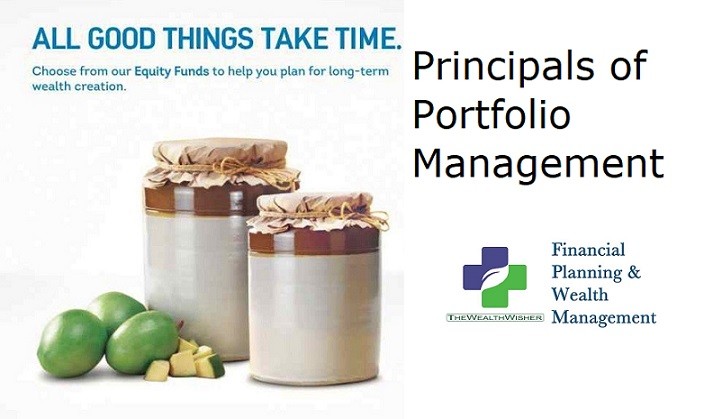It is a general perception that we financial advisors just eat, drink, talk & think investments or stock markets. Most of the financial planners including me do not even watch markets on Business Channels. It is not that they are bad, but these are a waste of time and learning is very less in proportion to time invested. Portfolio Management is not a cup of tea for TV anchors & specialist who change daily.
For us portfolio management is philosophy- We revolve our thought process around it.
 So, we work on a few principals which guide in recommending investments in particular equity investments. Most of them are behavioral but many are just plain fact emerging out of history. Here are a dozen principles that have served me & my firm well over the years.
So, we work on a few principals which guide in recommending investments in particular equity investments. Most of them are behavioral but many are just plain fact emerging out of history. Here are a dozen principles that have served me & my firm well over the years.
Portfolio Management Principals – Our Core Philosophy
- Markets are never insane. They are sum total of what information & emotions are in them. They are like dough for bread. You mix in correct proportion. Moment flour (liquidity), or water (fear & greed) is imbalanced it looks like dancing. So at any point in time, all shares are priced correctly- relative to information fed in the markets.
- Since point one is true (historically & numerically)- actively churning never add value through either security selection or market timing. All markets are good if you have done your homework. (Read Our Previous Post on Churning)
- The market is efficient but they face few anomalies These exist in all markets (Indian & International, all types of assets). They exist most of the time too. This shortcoming produces 2 vital things – value and momentum. It’s our choice we chose to play with momentum or value.
- It appears Equities are more safe then Bonds (Debt) if you look at the additional risk, cost, inflation, price fluctuations & tax benefits.
- It also looks like Penny Stocks don’t outperform Larger Companies. This is when you leave isolated examples and adjust for the huge risk involved in investing in penny stocks.
- But it is a fact that value and momentum are easy to find among smaller companies—which is why we also prefer smaller companies to be part of the portfolio.
- Once you invest, both diversification and cost control are crucial. We use mutual funds (Direct & Regular), Direct Equity & other Debt Products to ensure these. PMS, ULIPs & heavy front-loading options still need to satisfy us!
- Investing in 2 sectors is not diversification. You need to have more than 1 asset class (debt, gold, real estate) and more than 1 geography. If not during market turmoil, the benefit of diversification largely vanishes, because in one class all decline together. So if you have a real estate portfolio and there is a slow down both residential & commercial sector are hammered.
- If everything in your portfolio is going up or everything is going down – you aren’t diversified.
- In the US stocks declined between 45% and 55% in 1973-74, 2000-02 and 2007-09. Ours also has a similar story for 1992-93, 2001-02 & 2008-09. In the bad phase, the risky portion of their portfolios can decline by roughly half. (Read Previous Post on this)
You may call it “a fire drill” or “an expectation” or “necessary pain” to achieve the higher returns that are expected from risky assets.
- If shares or NAVs do not occasionally experience losses, they would reflect the artificial price. They need to fall enough to generate superior returns. As financial advisors, it’s our job to make sure client portfolios in align to the level of risk, and clients neither increase their risk when things look rosy (e.g. 2017) nor decrease it when things are bad. (e.g. 2018).
- For international exposure, we invest in larger companies and emerging markets like ours. The reason: Large-cap international and emerging markets offer much greater diversification as we already own “developing nation equity”.
- For additional diversification, we generally encourage NPS, PPF, International Funds & Structured Products.
- While we review portfolios (Quarterly), schemes we recommend (Monthly) and the market environment frequently, we make changes very infrequently.
 As Warren Buffett has said, “Much success can be attributed to inactivity. Most investors cannot resist the temptation to constantly buy and sell.” He also stated, “Lethargy, bordering on sloth, should remain the cornerstone of an investment style.”
As Warren Buffett has said, “Much success can be attributed to inactivity. Most investors cannot resist the temptation to constantly buy and sell.” He also stated, “Lethargy, bordering on sloth, should remain the cornerstone of an investment style.”
Once a client’s portfolio is invested appropriately, we will not encourage or suggest trading or churning or adding. This is a sign of prudence and patience, not inattention.
We do not make or distribute panic simply to appear busy.
The last thing that comes to my mind on Portfolio Management :
- If we manage multiple accounts for a family (Husband-Wife, Kids, Dependent Parents), we will manage them as one portfolio to increase tax efficiency. So when viewed alone individual accounts may look part of a race. But for us it is all ONE.
What do you feel about portfolio management?
Some points may have made you uncomfortable, but I am happy to have a word and share figures & facts in support. Would you like to suggest more? Feel free to put that in the comments section below.








